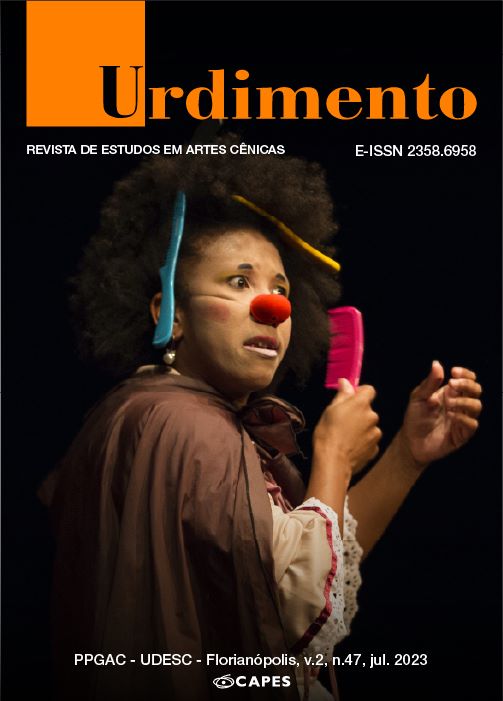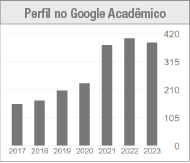¿Qué debemos decir? La recreación de la pieza didáctica brechtiana en Oratorium, de She She Pop
DOI:
https://doi.org/10.5965/1414573102472023e0207Palabras clave:
Teatro alemán, Brecht, Estética y políticaResumen
El artículo analiza la obra de teatro Oratorium, del grupo alemán She She Pop, y como busca actualizar el modelo brechtiano de Lehrstück para un escenario político contemporáneo, al discutir uno de los temas más urgentes de la sociedad berlinesa en su tiempo: la cuestión de la vivienda. Así, observamos cómo cierto teatro posdramático y cómico encuentra en el “no-saber” una potencialidad emancipatoria.
Descargas
Citas
BIRGFELD, Johannes (org.). She She Pop: Sich fremd werden. Berlim: Alexander Verlag, 2018.
BRECHT, Bertolt. “Para as Peças de Aprendizagem”. Trad. Mariana Sapienza Bianchi. Rebento 11, São Paulo, dez. 2019, 597-610.
GARCIA, Tristan. We Ourselves: The Politics of Us. Edimburgo: Edinburgh University Press, 2021.
GRÖSCHNER, Annett. “Feminismus allein reicht nicht”. In: QUIÑONES, Aenne (org.). She She Pop. Berlim: Alexander Verlag, 2022.
HAß, Ulrike. Kraftfeld Chor. Berlim: Theater der Zeit, 2020.
HOLM, Andrej. “Das Politische ist nicht nur privat“. In: nachtkritik.de, 13 maio 2019. Disponível em: https://www.nachtkritik.de/index.php?option=com_content&view=article&id=16746:oratorium-das-berliner-theatertreffen-2019-von-aussen-betrachtet-andrej-holm&catid=1725&Itemid=100075. Acesso em: 11 dez. 2022.
KON, Artur. “E a verdade não libertará etc. etc.: Sobre a peça Verdade, do grupo Tablado SP”. Revista Rosa 6, set. 2022. Disponível em: https://revistarosa.com/6/a-verdade-nao-libertara. Acesso em: 28 jun. 2022.
KÖNIG, Romy. “She She Pop: Politely but firmly to the boundary of shame”. The Theater Times, 9 dez. 2018. Disponível em: https://thetheatretimes.com/she-she-pop-politely-but-firmly-to-the-boundary-of-shame/. Acesso 11 jan. 2022.
KOUDELA, Ingrid. Brecht: um jogo de aprendizagem. São Paulo: Perspectiva, 1991.
KRIEGER, Sascha. “Lasst uns Summen”. Stage and Screen, 11 fev. 2018. Disponível em: https://stagescreen.wordpress.com/2018/02/11/lasst-uns-summen/. Acesso: 11 jan. 2022.
KUBERG, Maria. Chor und Theorie. Constança: Konstanz University Press, 2021.
LANGNER, Paul Martin e GOSPODARCZYK, Joanna (eds.). Zur Funktion und Bedeutung des Chors im zeitgenössischen Drama und Theater. Berlim: Peter Lang, 2019 (recurso digital).
LEHMANN, Hans-Thies. Escritura política no texto teatral. Trad. Werner S. Rothschild e Priscila Nascimento. São Paulo: Perspectiva, 2009.
LEHMANN, Hans-Thies. Teatro pós-dramático. Trad. Pedro Süssekind. São Paulo: Cosac Naify, 2011.
LEHMANN, Hans-Thies. Brecht lesen. Berlim: Theater der Zeit, 2016.
LEHMANN, Hans-Thies e VAROPOULOU, Helene. “Zukunft des Lehrstücks”. In: MASSALONGO, Milena, VASSEN, Florian e RUPING, Bernd (orgs.). Brecht gebrauchen. Uckerland: Schibri-Verlag, 2016, p. 401-418.
LUCASSEN, Lisa. “Wir sind einige von euch“. In: BIRGFELD, Johannes (org.). She She Pop: Sich fremd werden. Berlim: Alexander Verlag, 2018, p. 7-32.
MASCAT, Jamila. “Hegel and the Misadventures of Consciousness”. In: MASCAT, Jamila e MODER, Gregor (eds.). The object of comedy. Cham: Palgrave Macmillan, 2019, p. 51-73.
MATZKE, Annemarie. “Spiel-ldentitäten und Instant-Biographien. Theorie und Performance bei She She Pop”. In: KLEIN, Gabriele e STING, Wolfgang (ed.). Performance: Positionen zur zeitgenössischen szenischen Kunst. Bielefeld: transcript Verlag, 2005, p. 93-106.
MODER, Gregor. “Comedy as performance”. In: MASCAT, Jamila e MODER, Gregor (ed.). The object of comedy. Cham: Palgrave Macmillan, 2019, p. 231-246.
NANCY, Jean-Luc. A comunidade inoperada. Trad. Soraya Hoepfner. Rio de Janeiro: 7Letras, 2016.
NUNES, Rodrigo. “Posfácio – Por onde começar?” In: PARANÁ, Edemilson e TUPINAMBÁ, Gabriel. Arquitetura de Arestas. São Paulo: Autonomia Literária, 2022, p. 239-246.
PARANÁ, Edemilson e TUPINAMBÁ, Gabriel. Arquitetura de Arestas. São Paulo: Autonomia Literária, 2022.
POTTER, Nicholas. “Popping the property bubble”. Theatertreffen-Blog, 12 maio 2019. Disponível em: https://theatertreffen-blog.de/blog/popping-the-property-bubble/. Acesso em: 11 jan. 2022.
QUIÑONES, Aenne. “25 Jahre She She Pop”. In: BIRGFELD, Johannes (org.). She She Pop: Sich fremd werden. Berlim: Alexander Verlag, 2018.
SAFATLE, Vladimir. Cinismo e falência da crítica. São Paulo: Boitempo, 2008.
SARRAZAC, Jean-Pierre. Poética do drama moderno: de Ibsen a Koltès. Trad. Newton Cunha, J. Guinsburg e Sonia Azevedo. São Paulo: Perspectiva, 2017.
SÜSSEKIND, Flora. Coros, contrários, massa. Recife: Cepe, 2022 (recurso digital).
Publicado
Cómo citar
Número
Sección
Licencia
Derechos de autor 2023 Urdimento

Esta obra está bajo una licencia internacional Creative Commons Atribución 4.0.
Declaración de Derecho de lo Auctor
Los artículos publicados por la revista son de uso gratuito. Los derechos de autor son todos cedidos a la revista. Los artículos cuyos autores son identificados representan la expresión del punto de vista de sus autores y no la posición oficial de la revista Urdimento. El autor o los autores se comprometen a que publiquen material referente al artículo publicado en la Revista Urdimento mencionar dicha publicación de la siguiente forma:
"Este artículo fue publicado originalmente por la revista Urdimento en su volumen (poner el volumen), número (poner el número) en el año de (poner el año) y puede ser accedido en: http://www.revistas.udesc.br/index.php/urdimento
Este periódico utiliza una Licencia de Atribución Creative Commons - CC - BY 4.0.



